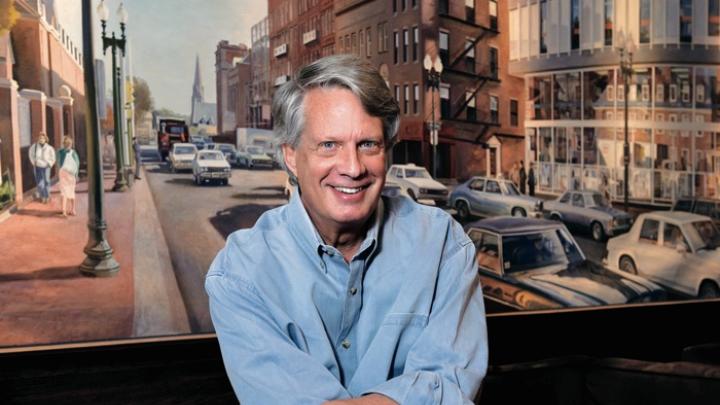If graduating seniors wondered whether Commencement marked the end of all their Harvard fun and learning, Robert R. Bowie Jr. ’73 was there on Class Day to tell them, “Hell, no!” In fact, the new president of the Harvard Alumni Association (HAA) promised, all young alumni will discover the “tremendous power of the Harvard network”—and its surprising reach.
Bowie (pronounced “boo-ey”) told seniors about an HAA-organized spring-break trip to Egypt for alumni and undergraduates, during which a passerby noticed a Harvard cap worn by John Corbett ’13. The man was an alumnus and rabbi who was renovating a temple in Cairo and met with the group at length, providing insights into Egypt, its history, and contemporary life that the travelers would not have gleaned first-hand otherwise. “No matter where you find yourself in the world at any point in your life,” Bowie concluded, “it is quite likely that a Harvard connection is close by.”
Such examples underlie Bowie’s vision for strengthening alumni ties to undergraduates. The HAA ran similar trips this year to Ghana and Greece, and is developing additional ways to support such cross-generational relationships by bringing the value of the University network to bear. “I would like Harvard to be there to support alumni at each stage of their lives—to be as far away or as close as they like,” Bowie explained during a recent interview. He and HAA deputy executive director Philip Lovejoy and others met this summer to discuss ways to expand digital communications to the same end, especially on the interactive front. “Alumni can think about the HAA as ‘My Harvard,’” Bowie says, “and take advantage of a huge array of opportunities and elements like clubs, Shared Interest Groups, reunions, and online social media to personalize their experience.”
Bowie has come by this construct naturally. “I was surrounded by Harvard from the beginning. My heroes were the Harvard hockey team—with Olympic gold medalists Bill [’56] and Bob [’58] Cleary—and the football team,” he says. “When I was a youngster and they opened the [Stadium] gates at halftime and anyone could get in, I would be there.” Though he now lives in Monkton, Maryland, he grew up in Cambridge, the son of centenarian Robert R. Bowie, J.D. ’34, who was a Law School professor from 1946 to 1955 and founded what is now the Weatherhead Center for International Affairs in 1958. The younger Bowie transferred to Harvard from Denison, and never took the place for granted: “Every morning I woke up and I was filled with joy to be an undergraduate at Harvard,” he says enthusiastically. “There is nothing like having your world shaped by great professors.” His tutor was Lowell professor of the humanities William Alfred, a playwright and poet. “He would talk about literature as he sat and fed the squirrels peanuts,” Bowie recalls. “He was a wonderful man and mentor and so influenced my love of poetry and literature.”
After graduating, Bowie moved to Washington, D.C., to be near the “action of Watergate and everything that was going on” (his father had worked closely with presidential advisers Henry Kissinger ’50, Ph.D. ’54, L’55, and John J. McCloy, LL.B. ’21). He became a legislative aide to then-U.S. Senator Charles Mathias (R-Maryland), and says he got the job because in Cambridge he had lived next door to Mathias’s father-in-law, former Massachusetts governor Robert F. Bradford ’23, LL.B. ’26—another sign of powerful personal networks, he allows. In time, he graduated from the University of Maryland School of Law. Today he is the founding partner of Bowie & Jensen, LLC, a firm focused on business and intellectual-property litigation and transactions.
On the side, Bowie has worked for and chaired the HAA’s schools and scholarships committee (he was a 2009 recipient of the HAA’s Hiram Hunn Award for alumni service) and is a key participant, and former board member, of the Harvard Club of Maryland, where he also chaired the schools and scholarships committee and interviewed applicants for decades. For his work as founder of the club’s Early College Awareness Program, which reaches out to junior-high-school students whose families have not traditionally planned for college, he won the 2005 Excellence Merit Award from Baltimore County. He currently helps run three sessions a year that celebrate college attendance with students and guidance counselors.
In his spare time, Bowie has written eight plays that have been performed in Baltimore-area theaters, and numerous poems posted at www.bowie.com. “Without the arts we are a rudderless boat,” he says. He also supports the arts directly by serving on the governing boards of the Everyman Theater and the Single Carrot Theater, a start-up drawn to the city because of its fertile downtown arts community. “Really fine art gives you a sense of getting out of your own little world and a sense of purpose and vision that you can live off,” he says. “As a culture, we have not really integrated the arts into our lives the way we should. We’re all too busy making money and losing money and getting old.”









